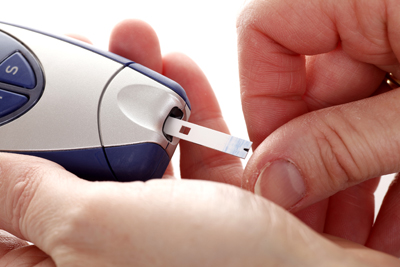 Do You Have Diabetes?
Do You Have Diabetes?
Your Medical Record
Diabetes is on the increase, but it is an easily treatable condition.
Our bodies are like a motorcar; they need fuel to provide us with energy. This energy comes from glucose, a type of sugar that is found in what we eat and drink. However the glucose cannot get from our blood stream into the body cells by itself. It needs the help of a hormone called insulin, which is produced by the Pancreas (a gland behind the stomach).
When we eat our blood glucose (sugar) levels rise, this triggers the Pancreas to produce insulin which in turn 'unlocks' the cells to let the glucose enter, giving us the energy we need and lowering the blood glucose.
Diabetes is when these blood glucose levels do not return to normal levels due to a lack of Insulin.
There are 2 main types of Diabetes:
Type 1 Diabetes is when the Pancreas suddenly stops working altogether and is more often found in children and young adults. This type of Diabetes needs treating with Insulin.
Type 2 Diabetes is the most common form of Diabetes and is usually found in people with one or more of the following:
- Family History of Diabetes
- Excess weight (obesity)
- High-fat diets
- Lack of exercise
In type 2 diabetes, blood glucose levels are higher than normal, even when not eaten. One of the main reasons for this is that the insulin does not seem to work properly. The Pancreas is producing insulin, but the body's cells do not respond normally to it. At this stage a person does not realise the problem as the Pancreas produces more Insulin to keep the blood glucose levels at a normal level. Eventually the Pancreas cannot produce enough insulin to overcome this and the blood glucose levels begin to rise. In some cases giving rise to the following symptoms:
- Thirst
- Passing more water
- Tiredness
- Blurred vision
In some cases there are no symptoms.
The treatment is simple:
- Lose weight if you are overweight
- Take more exercise
- Your doctor may prescribe some medication to improve blood glucose control.
If you suspect you have Diabetes make an appointment with the Practice Nurse who can organise a simple blood test.
If you suspect you have Diabetes make an appointment with a GP.
Diabetes Team
Reception Staff
Our team of receptionists are there to help you and will direct you to the most appropriate appointment for you.
Health Care Assistants
Sandra Bedford, Angie Gibbons, Keeley Gibbs and Kirsty Wright make up the team. They are also trained phlebotomists and can take your blood sample at a given appointment.
Nurse Specialist Practitioner
We have 2 Nurses who have received specialist training in the management of Diabetes, Sarah Kiddie and Shirley Cookson lead in diabetes. They are also available should you have any questions. You can either book an appointment or if it is a quick query you can telephone and one of the two nurses will return your call when they are available, which will be as soon as possible. Sarah Kiddie is our lead nurse for the management of diabetes.
Doctors
Most of the doctors help at the diabetic clinic and support our specialist practitioner nurse in your diabetic care, they are the ones who make the initial diagnosis and help in the management of the Diabetes and help manage medication.
MANAGEMENT OF TYPE 2 DIABETES
Step 1 Diagnosis
This is made by 2 simple fasting blood tests in most cases. If the blood glucose is 7mmols or higher or if you are having symptoms of diabetes and one fasting blood glucose reading 7mmols or higher then a diagnosis of diabetes can be made.
Step 2 Education
An appointment is offered with our diabetes specialist nurses who explain to you what diabetes is and what lifestyle changes could improve your management of diabetes
Step 3 Self-Management
Our diabetic specialist nurses will teach you how to manage your own diabetes and will liase with the doctor and initiate or change treatment as required
Step 4 Monitoring
Our diabetic specialist nurse will monitor your diabetic control with the aid of blood tests on a 6 monthly basis if your diabetes is well controlled but more often if need be. This blood test is called HbA1c and tells us if your diabetes is well controlled, ideally this reading needs to be 5 to 7mmols.
Step 5 Prevention of Complications
Every year you will have a test on an early morning sample of your urine to check diabetes is not affecting your kidneys. You will also have a series of blood tests to check your cholesterol, Liver and Kidney function and HbA1c (blood glucose control) and you will be given an appointment with the nurse (Annual review appointment). Where you will have a full medical examination.
Step 6 Eye Check
As diabetes can affect your eyesight you will be offered an appointment to have the back of your eyes photographed to enable the doctor to monitor any changes and instigate any treatment needed.
Management of diabetes is a team effort and you are the main team player we are here to support you. However we can only help you if you attend our clinics and work with us. If clinic times are not convenient we can sometimes see you at other times. Please discuss this with your nurse.